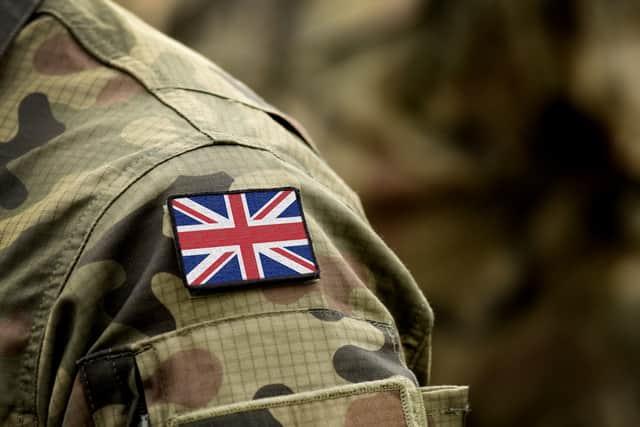What is a Non-Freezing Cold Injury? ‘Trench foot’ causes, symptoms of condition and is the MoD paying damages?
and live on Freeview channel 276
More commonly associated with the First World War, trench foot is still causing life-changing injuries for soldiers.
Known now as Freezing Cold Injury (FCI) or Non-Freezing Cold Injury (NFCI), some of those affected have seen their career prospects damaged after developing severe injuries from the condition.
Advertisement
Hide AdAdvertisement
Hide AdNow, a leading solicitor has said test cases recently settled by the Ministry of Defence relating to four individuals could see more people come forward.
But what causes the condition and how can it affect people? Here’s what you need to know.


What is FCI or NFCI?
FCI occurs when the tissue temperature falls below 0 degrees.
NFCI is caused by prolonged exposure to cold and wet conditions, in temperatures ranging from 1-15 degrees.
Advertisement
Hide AdAdvertisement
Hide AdCold injuries mainly affect the hands and feet, with symptoms including colour changes, numbness, pain, burning, pins and needles, sensitivity to the cold and even blistering.
A survey of armed forces personnel who served in the Falklands war found that 64% of soldiers in infantry units had experienced symptoms of NFCI.
Speaking to NationalWorld about the impact FCI and NFCI can have, Simon Ellis, partner and head of the Hugh James military team said: “Freezing Cold Injury in the past was known as a trench foot.
“So back in the First World War, and in very severe cases, it can lead to things like gangrene or even amputation.
Advertisement
Hide AdAdvertisement
Hide Ad“Fortunately, these are a lot less common these days. But it's fair to say that it can have a very significant impact on daily life.”
How can it affect those suffering from it?
Some of the test claimants’ injuries were so severe that they were medically downgraded and discharged, which has hampered their future promotion and career prospects.
Those with this injury who were subsequently discharged from the forces, now can’t apply for some civilian jobs that involve working outdoors due to their ongoing symptoms and sensitivity to the cold.
The condition has also impacted their quality-of-life and ability to enjoy everyday activities like walking in the colder months and playing outdoor sport.
Advertisement
Hide AdAdvertisement
Hide AdSimon Ellis said: “Those that suffered with a cold injury often find that they are medically discharged from the military with the injury.
“And for those who want to stay in the military and have a full, long career, that’s pretty much a huge loss.
“Even in civilian life, it can have quite profound effects. Our clients tell us that they’re often unable to work outdoors for long periods if it’s cold or wet. And that can have a negative impact on their employment opportunities in the future.
“It can also affect their family activities. Even things like going for a walk with your family on a cold day may not be possible for those with this injury. So it can extend into all aspects of daily life.”


Advertisement
Hide AdAdvertisement
Hide AdOne of those affected by the condition is a former Army Ranger, known as Mr NB, who first developed NFCI following a training exercise in the Brecon Beacons, in temperatures as low as minus 12.
He had been wearing standard issue boots as there were no cold weather boots in his size.
Having to wade through water and mud and sleep in damp kit, his symptoms led him to be hospitalised for a week and medically downgraded for a year.
He was medically discharged and can no longer pursue a career which takes him outdoors. His symptoms have contributed to his depression, alcoholism, and anxiety.
Advertisement
Hide AdAdvertisement
Hide AdSpeaking of life after the army, he said: “It has been difficult to come to terms with no longer being in service. I have not experienced the same enjoyment from any role similar to the enjoyment I experienced in service.
“My life has not been the same since sustaining my cold injury.”
Is there a lack of awareness of FCI and NFCI?
Simon said while in some cases very good training was given, it was “not universal” and not every new recruit would be aware of the risks.


He said: “Many people who developed this injury actually get it during basic training. So they're not long in the military, they don't have a great deal of experience.
Advertisement
Hide AdAdvertisement
Hide Ad“They're essentially learning the ropes in the early stages of that career. As part of your basic training, you often spend your time training in cold and wet conditions.
“If you're not trained about the risks of cold injuries, and what to look out for, those who start to develop the injury will frequently just push through until the point where the injury count will be reversed and it becomes permanent, cold injuries are very easy to prevent.“
Making sure someone has the right kit for the environment they are in is crucial says Simon, as well as appropriate training on when to spot the symptoms and what to do if they develop them.
He said: “The vast majority of our clients develop the injury even though it's entirely preventable, simply because they weren't given the right kit.
Advertisement
Hide AdAdvertisement
Hide Ad“They weren't allowed to carry out basic admin to keep their hands and feet dry. And they weren't told what signs to look out for when the injury starts to develop. I think had any of those steps been taken in most cases, it's likely the cold injury may never have actually occurred.”
Is there a stigma attached to the injury?
Some of those affected by NFCI or FCI feel there is a stigma surrounding their injury and feel discouraged from reporting it.
Among those who encountered this is a former Lance Corporal, known only as Mr M, who served for four years before being downgraded due to problems with his feet brought on by prolonged exposure to the cold during a promotional course.
While he voluntarily left the army, the NFCI contracted while serving means that he can no longer work in an environment that exposes him to involuntary cold exposure.
Advertisement
Hide AdAdvertisement
Hide AdHe said he felt that highlighting and reporting his symptoms was discouraged, saying: “There is a stigma attached to NFCI in service and I experienced this first hand.
“I felt like complaining about this type of injury was discouraged. I felt that the active discouraging of reporting symptoms did not help my injury. My injury was not taken seriously when I initially reported my symptoms and this caused delay in me being removed from the cold.”
What happened with the test cases?
One month before the test cases was due to go to trial, the MoD agreed to pay damages to the claimants.
Simon believes the test cases could pave the way for others suffering with cold injuries such as FCI and NFCI to receive damages, even if that injury occurred many years ago or they have been turned down in the past.
Advertisement
Hide AdAdvertisement
Hide AdThe Hugh James military team is currently acting for over 250 serving personnel and veterans who have suffered a cold injury,
Speaking of the test cases, Simon said: “One month before this test case was due to go to trial, the MoD has now agreed to pay significant damages to the test claimants suffering with an avoidable injury that will affect them for the rest of their lives.
“I'm very pleased for the individuals concerned that they didn't have to go through a trial in order to get justice in these cases. We have seen an increase in the number of inquiries we are receiving for those with a cold injury. And we're now assisting those particular individuals with their cases.
“But there is no reason why anyone who's suffered a cold injury shall be concerned about bringing a claim. And certainly I'd encourage anyone who thinks they may have had this injury to come forward and seek advice.”
Advertisement
Hide AdAdvertisement
Hide AdSimon added: “Many of those who suffer the injury, they don't initially appreciate the significant impact it may have on them in later life, particularly in terms of future employment, whether that be in the military or in a civilian context.”
In a statement an MoD spokesperson said:“The health and wellbeing of our people is always our priority and we provide personnel with the training and kit they need to deal with cold conditions.”
Comment Guidelines
National World encourages reader discussion on our stories. User feedback, insights and back-and-forth exchanges add a rich layer of context to reporting. Please review our Community Guidelines before commenting.
